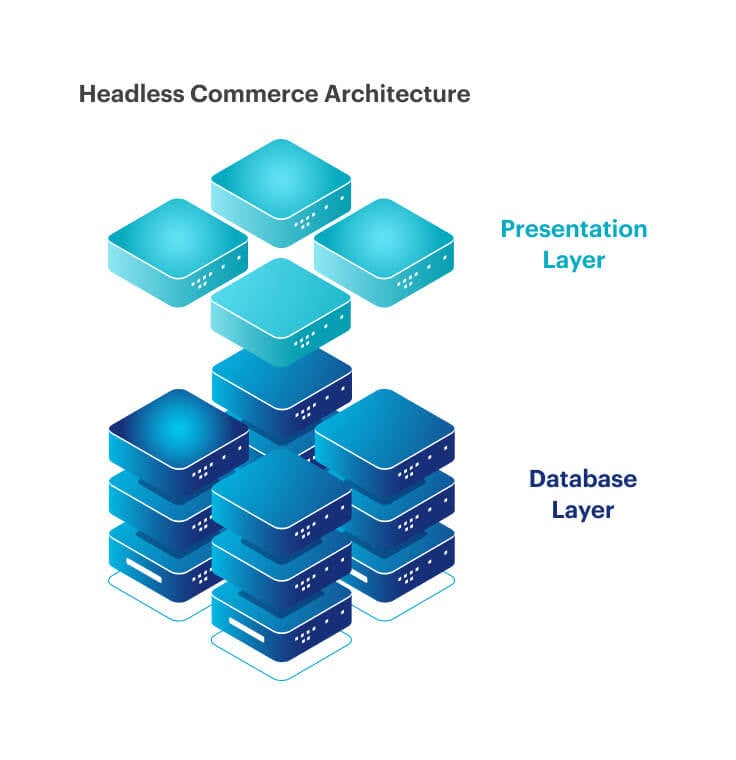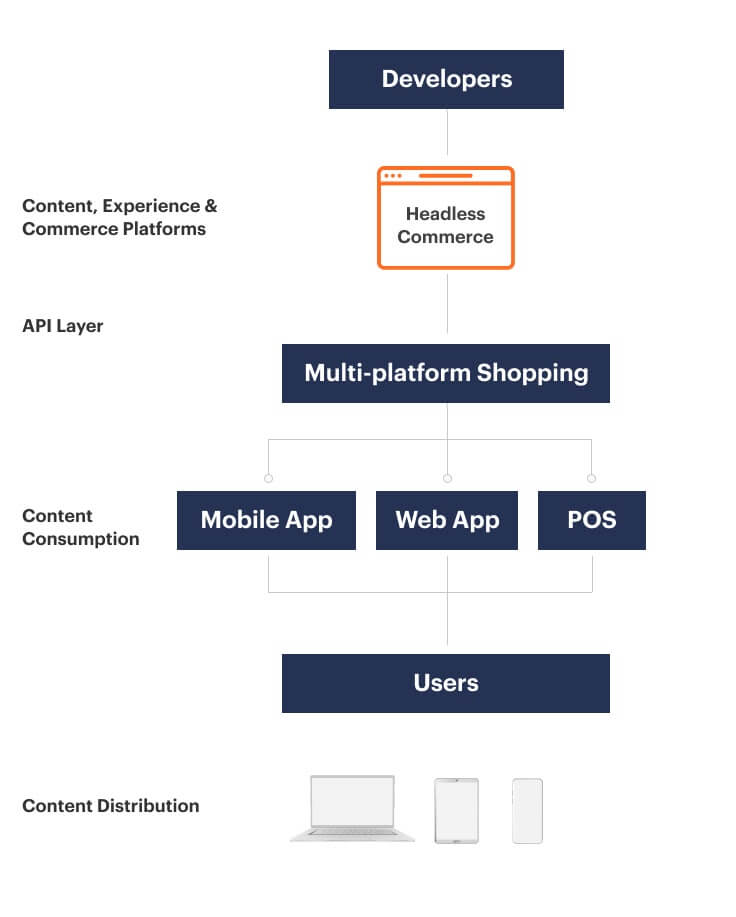Covid19 pandemic has surely made 2020 challenging, especially for retail and eCommerce businesses. But despite a tough year, a report from eMarketer estimates that worldwide eCommerce will grow at 27.6% CAGR. It also says that the eCommerce business will approach the $5 Trillion mark this year. But how can your business be one of them? The answer is headless commerce.
You would have probably heard about headless commerce as it is slang in the eCommerce industry. But with so much content on the internet, there is a lack of clarity. To set it out straight and clear, we have covered the basics of Headless Commerce. In this article, you’ll learn about:
- What is headless commerce?
- Headless commerce definition
- Headless commerce architecture
- Benefits of headless commerce
- Few disadvantages of headless commerce
Headless Commerce Definition
In simple terms, Headless Commerce is just a partition of the back-end and front-end layers of an ecommerce application. Thus, headless ecommerce platforms manage both layers separately.

Whereas, in technical terms, the definition of headless commerce can be given as:
“Headless Commerce is a type of e-Commerce architecture where the presentation layer is decoupled from the database functionality and can be managed without any front-end. Headless Commerce solutions are almost similar to Headless CMS.”
Now you know what is headless commerce, let us understand how exactly headless commerce works.
Headless Commerce Architecture
Headless commerce architecture is nothing but a subset of decoupled architecture. This architecture consists of two independent layers, generally called front-end and back-end.
Headless commerce architecture focuses on delivering content to multiple platforms through APIs.

For Example, when a user submits an order on your eCommerce application, the frontend layer of headless commerce sends an API request to the backend layer to process the order. Similarly, the backend layer sends another API call to the front-end layer to confirm the order status.
Thus both presentation (front-end) and application (back-end) layers communicate with each other through APIs.
Benefits of Headless Commerce
There are definitely many advantages of headless commerce. This is why tech giants like Amazon, Nike, Toyota, Tesla, McDonald’s, and many more are at the forefront of adopting it.
So if you are considering switching to headless commerce, here are the most common headless commerce benefits for you.
1. Omnichannel Experience
The most crucial benefit of headless commerce is that it lets you share your content anywhere and everywhere. You can share product details, videos, customer feedback, blogs, or any other content on multiple platforms.
2. Personalized Customer Experience
Headless commerce allows you to create a personalized customer experience across all channels. You already have the customer data at the backend; headless commerce utilizes that data and creates a personalized ecommerce experience for each user.
3. Flexibility For Developers
Another advantage of headless commerce is that it offers high flexibility to developers. As the layers are decoupled, developers can work with complete freedom without worrying about the effect on another layer. Besides this, in headless commerce, developers can choose their desired framework, languages, and platforms as per their requirements.
4. Easy Integrations
As headless architecture works based on APIs, it is easy to integrate anything with your ecommerce solution. You can outreach to multiple devices and channels with quick and easy integrations. Thus it allows you to reach out to a large base of audience in less time.
5. Faster Time To market
It does take a lot of time and resources to build any functionality in traditional ecommerce. Whereas, headless commerce benefits you to creating faster customer experiences at multiple touchpoints. Thus, it is very effective while entering new markets, regions, or channels.
6. Simple & Easy To Use
With multiple features and functionalities, headless commerce is straightforward to use. Teams can easily access and update the front-end without any major technical skills. At the same time, there are no steep learning curves in adopting headless commerce.
These were the significant benefits of headless Commerce. It also has several other advantages such as high scalability, future proof, microservice architecture, complete site ownership, and many more.
The downside of Headless Commerce
With so many advantages, there are few disadvantages of headless commerce as well. Though, these drawbacks depend entirely on how you choose your headless solution and can be completely managed.
1. Implementation Cost
Headless Commerce does not come with a ready-made front-end, so developers have to create their own. This may require some time, resources, and basic implementation costs. Apart from that, enterprise versions of few headless commerce platforms are quite costly. So you must choose the most suitable platform keeping the implementation cost in mind.
2. Technical Maintenance
Headless commerce solution requires writing custom codes. Due to that, there is a requirement of maintenance at the time of rework or adding new codes. Thus you need to keep an eye on the performance and implement necessary changes when required.
These disadvantages of headless commerce do not affect every user as most of them have resources to handle them.
Conclusion
Whether you are an inexperienced beginner or an expert in the ecommerce industry, you’ll have to adopt headless commerce to scale your business. As Heraclitus quotes, “ Change is The Only Constant “, traditional e-commerce users are shifting to headless commerce.
If you are one of them who is considering switching to headless commerce, we are here to help you out. Contact Us today to get headless CMS & ecommerce related guidance and services.
Further Readings On Headless









